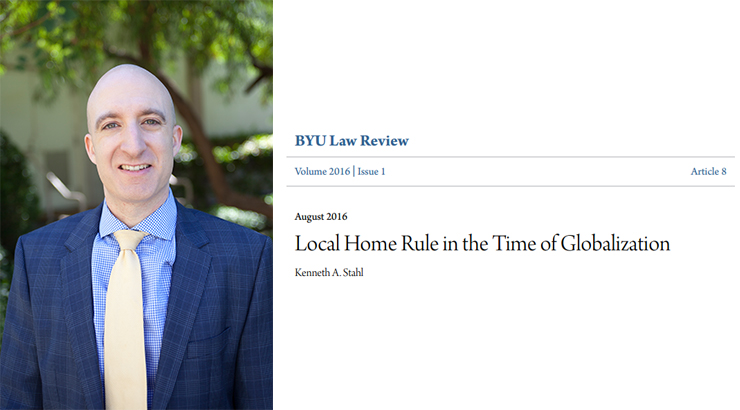
Fowler Law Professor Kenneth Stahl Publishes “Local Home Rule in the Time of Globalization”
October 1, 2016
Chapman University Dale E. Fowler School of Law Professor Kenneth Stahl’s article “Local Home Rule in the Time of Globalization” was recently published in Volume 2016, Issue 1 of the BYU Law Review.
From the abstract:
Cities are increasingly taking the lead in tackling global issues like climate change, financial regulation, economic inequality, and others that the federal and state governments have failed to address. Recent media accounts have accordingly praised cities as the hope of our globally networked future. This optimistic appraisal of cities is, however, undermined by local governments’ cramped legal status. Under the doctrine of home rule, local governments can often only act in matters deemed “local” in nature, and cannot regulate “statewide” issues that may have impacts beyond local borders. As a result, the global issues that local governments are being praised for confronting are, almost by definition, the very sort of matters that home rule doctrine prohibits them from addressing.
This article has three goals: first, it aims to show why home rule has persisted in its present form despite its incompatibility with globalization; second, it explains some of the implications of our adherence to an outmoded conception of home rule; and third, it draws on these observations to suggest a new approach to home rule. I argue that the extant home rule doctrine is part of an ideology that the judiciary finds attractive, called liberalism. Liberalism seeks to disaggregate various aspects of human life – the state, the market, and the family, particularly – and assign them to distinct spheres. The dichotomy between statewide and local affairs is a means of preserving the boundaries among the state, the market and the family by tasking the state to regulate the marketplace and local governments to regulate the family. In light of globalization, however, it is clear that the liberal separation of spheres has had a different result. Following Karl Marx, scholars have argued that the separation of spheres has masked the dominance of capitalism, or, alternatively, the state, in all the putatively autonomous realms. Home rule has had precisely this effect. The idea that regulation of the family is local disguises the hegemonic role of the state in family matters, while the idea that commercial regulation is statewide has enabled mobile capital to overwhelm regulatory constraints. I propose a new model of home rule that is not married to obsolete notions of separate spheres, and thus enables the local to serve as a vital counterweight to capital and the state.
Kenneth Stahl is a Professor of Law and the director of the Environmental, Land Use, and Real Estate Law certificate program at Chapman University Fowler School of Law. His scholarly work focuses on the relationship between the local political process and judicial doctrine in land use and local government law. His research combines doctrinal analysis with insights from disciplines including urban sociology, geography, economics, and the humanities. Professor Stahl’s works have appeared in journals including The University of Pennsylvania Law Review, the Harvard Civil Rights-Civil Liberties Law Review, and Cardozo Law Review, among others. He was selected as a participant at the 2012 Junior Faculty Forum at Harvard Law School. Professor Stahl has also been named Professor of the Year at Fowler School of Law. Before joining Fowler, Professor Stahl spent four years as an Assistant United States Attorney in the Eastern District of New York. Prior to that, he worked as a Trial Attorney for the United States Department of Justice, Office of Constitutional Torts, and as an Associate at the Washington, D.C. law firm of Arnold & Porter. Professor Stahl earned a B.A. with Highest Honors and Highest Distinction from the University of Michigan, and a JD from Yale Law School. At Yale, he served as a Notes Editor of the Yale Law Journal and an editor of the Yale Journal of Law and The Humanities.

